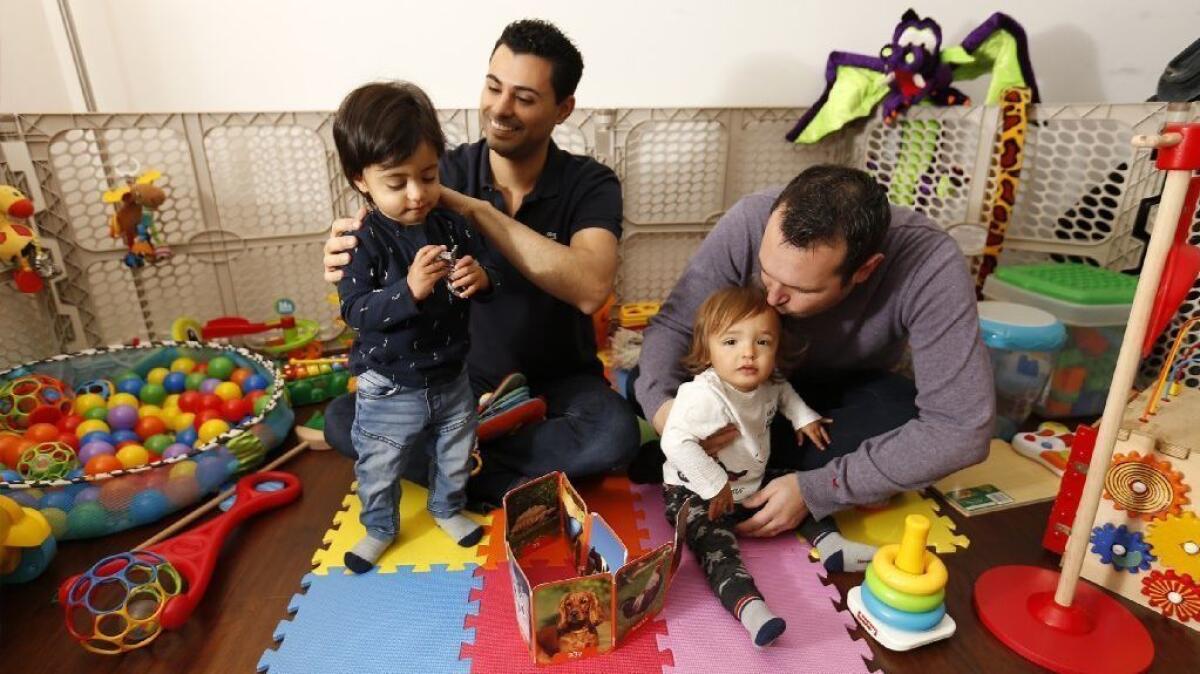Judge decides that twin son of binational gay couple is entitled to birthright U.S. citizenship

A federal judge has decided that a twin son of a binational gay couple, who was denied U.S. citizenship because he does not share a blood relationship with his American father, has been a U.S. citizen since birth.
In an 11-page order delivered Thursday, Los Angeles federal Judge John F. Walter concluded that U.S. law does not require a child to show a biological relationship with both of their parents if their parents were married at the time of their birth. The judge requested that the State Department and Ethan Dvash-Banksâ family together propose a judgment, consistent with his decision, by the end of the month.
âThis is a huge victory for Ethan Dvash-Banks and his family,â said Aaron C. Morris, executive director of Immigration Equality and one of the attorneys representing the family. âThey wanted their twin boys in every way to be treated exactly the same. It really hurt them to have one child get the remarkable privilege of U.S. citizenship at birth and the other to be required to petition as an immigrant.â
A U.S. State Department official said Friday that the agency is reviewing the ruling with the Department of Justice but did not comment further.
Andrew and Elad Dvash-Banks met in 2008 at a holiday party at Tel Aviv University in Israel, where Andrew was studying abroad and Elad was born and raised. They fell in love and, two years later, were married.
They intended to settle in Andrewâs home state of California, but because same-sex marriages were not allowed at the time, his husband couldnât obtain lawful permanent residency in the U.S. through his marriage.
So they settled for a time in Canada. Eventually, they decided to grow their family.
Ethan and his twin brother, Aiden, were conceived using an anonymous donorâs eggs and the sperm of their fathers. The twins, now age 2, were carried and delivered by a surrogate. Aiden shares DNA with Andrew, a Santa Monica native, while Ethan is biologically related to Elad.
After the twins were born, four minutes apart, the couple applied to get their sonsâ U.S. passports. They were stunned when an official told them that Andrew Dvash-Banks would have to undergo a DNA test to prove a biological link to each twin. Without that, the official said, neither child would qualify.
They arranged a DNA test and submitted the results.
Aidenâs passport came in the mail, while Ethan got a letter saying his citizenship application had been denied. The boy entered the U.S. on a six-month tourist visa, which has since expired, and applied for a green card.
Morris said the family, which now lives in Los Angeles, had to cancel travel plans to introduce the children to Eladâs family in Israel, and has struggled with costs related to securing Ethanâs citizenship.
When the family filed the lawsuit in January 2018, LGBTQ immigrant rights advocates said their case exposed the unique immigration challenges facing binational LGBTQ couples, which number about 36,000 in the U.S.
In the decision, the judge said the Immigration and Nationality Act sets different requirements for birthright U.S. citizenship for children born abroad to married parents and those born abroad out of wedlock. Children born out of wedlock, he wrote, require a blood relation to the U.S. citizen father. The familyâs attorney said the State Department applied that rule to the Dvash-Banks family when it denied Ethan citizenship.
âThey felt that the U.S. government wasnât respecting their marriage, which was true,â Morris said of the family. âBy referring to this strange out-of-wedlock provision, they werenât giving the couple the same rights as every other married couple.â
The judgeâs decision left the family relieved.
âThis hurt us every day,â Andrew and Elad Dvash-Banks said in a statement. âNow our boys will be treated exactly the same, which is all we ever wanted.â
The judge did not weigh in on the constitutionality of the State Departmentâs actions.
âThis doesnât dismantle the policy, but itâs a strong indication that the State Departmentâs policy is wrong and should be revamped,â Morris said. âIf they donât, we will simply have to sue again in other districts in other circuits until they get it right.â
Twitter: @AleneTchek
More to Read
Sign up for Essential California
The most important California stories and recommendations in your inbox every morning.
You may occasionally receive promotional content from the Los Angeles Times.










